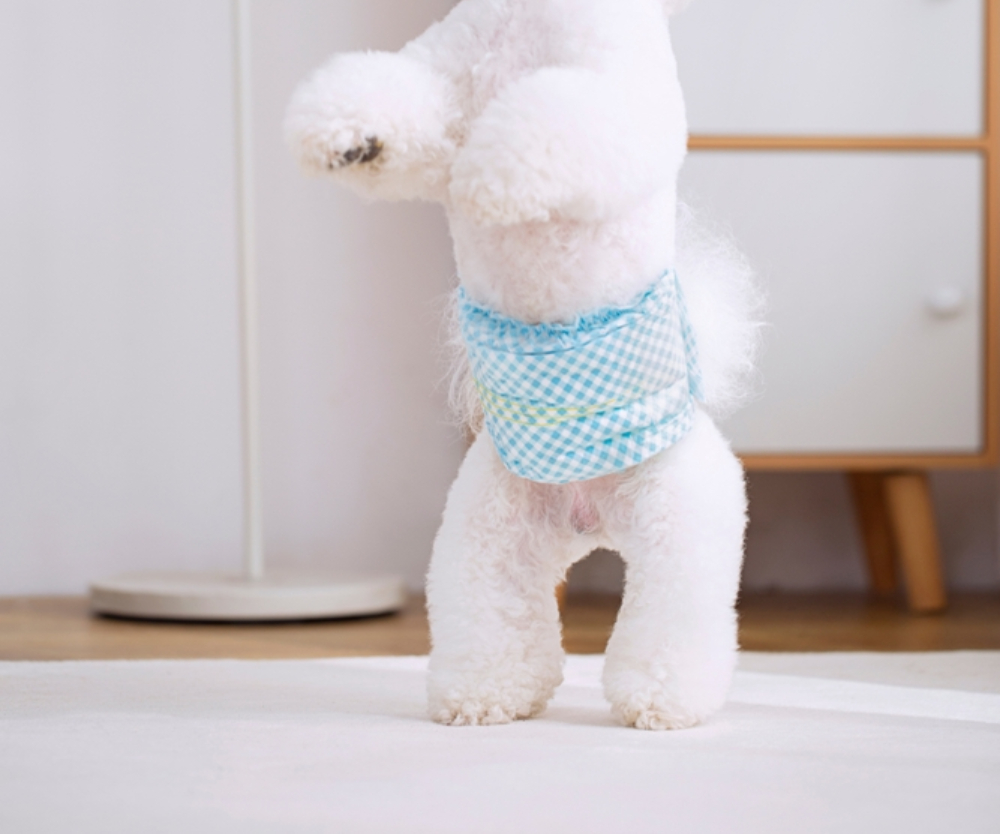
Dogs are man’s best friend, but despite their status, they sometimes do things we don’t love. One example is when male dogs pee in the house. Of course, in some instances, a dog can’t help doing this due to incontinence or health issues; however, dealing with all that urine isn’t fun, no matter why it’s happening.
Luckily, there’s something you can do if you’re dealing with a male pup who is eliminating inappropriately! If you haven’t tried one, we highly suggest utilizing a belly band for male dogs peeing in the house. What’s a belly band for dogs? It is a band made of absorbent fabric designed to catch urine of male dogs. Here’s a closer look at everything you need to know about dog belly bands, including their advantages and disadvantages. We’ll even include how you can make your own DIY dog belly band!


How Does It Work?
Belly bands are quite simple. These products are bands made of diaper material or other absorbent fabric designed to catch urine when used on male dogs. The belly band fits around a dog’s waist and covers the penis, so any time the dog pees with it on, the urine is caught, and your floors stay clean. Some dogs will quit eliminating inappropriately after wearing a belly band because the belly band deters them from wanting to urinate while it’s on. Other dogs will still pee, regardless. Either way, your floors and carpets are safe!
What’s the Difference Between Belly Bands and Doggie Diapers?
If you’re wondering what the difference is between belly bands and doggie diapers, you’ll find several.
One key difference is that diapers can be used for any sex of dog. In fact, diapers are often used for females in heat. However, belly bands are strictly for male pups.
Another difference is in their appearance. While the belly band is just a strip of absorbent material that wraps around a dog’s waist, a diaper looks like, well, a diaper. It’s attached to the waist of a dog, but it’s a full-coverage diaper with a hole for a dog’s tail.
A significant difference between diapers and belly bands is that diapers catch urine and feces. So, if a dog is having trouble not peeing and pooping in the house due to incontinence, illness, surgery, or simply because they’re being house-trained, a diaper would work better. Diapers can also hold a lot more urine than a belly band can, as belly bands will begin to leak if you leave them for too long.


Where Is It Used?
Belly bands can be used anywhere. If you’re having issues with inappropriate elimination at home, you can wrap a belly band around your pup while you try to figure out how to fix the problem. You can also use belly bands during travel if you think your pup might pee in the car on a trip. You can also use belly bands if you’re bringing your dog with you on errands and are afraid they might urinate in a business. Essentially, belly bands can be used anywhere and everywhere!
As for when belly bands should be used, these should only be utilized in situations involving incontinence, submissive urination, overly excited dogs who pee when they meet new people, illness, surgery aftermath, spot marking, etc. You do not want to use a belly band while you’re potty training a puppy, when they’re outside, or when leaving them in a crate. Belly bands are also not for use as a long-term option; instead, they should be used as a temporary solution while trying to determine the best way to stop a dog from peeing where they shouldn’t.


Advantages of Belly Bands for Dogs
One of the main advantages of this product is belly bands are much simpler to put on a dog than a diaper. They’re easier to remove, too, which makes the whole process of dealing with urinary problems more comfortable for you and your pup. Belly bands are also often easier for canines to adjust to wearing.
Another advantage is that belly bands are washable and reusable. There are some diapers that are reusable, but many doggie diapers are disposable. With a belly band, you can simply have a few on hand, so you can remove a used one, toss it in the wash, and then replace it with another as needed.
Belly bands are also affordable, as buying a 3-pack of belly bands won’t set you back too much. Plus, you can even make your own belly bands if you’re up to the task, which will save you even more money.
Finally, the most significant benefit of a belly band is that it keeps your dog from peeing on your floors or elsewhere!


Disadvantages of Belly Bands for Dogs
Belly bands do come with disadvantages, too, though.
For example, these bands need to be checked often to see if your dog has used them (as they aren’t designed to hold much urine) and changed throughout the day. So, you can’t simply put a belly band on your pup at the beginning of the day and leave it on until evening.
The belly band can also cause skin irritation or even infection. These issues tend to occur when the band isn’t properly fitted, changed often enough, or cleaned well enough. Skin issues can also occur if a dog wears a belly band for longer than they should.
Lastly, some dogs find belly bands uncomfortable. They may try to chew the band off or otherwise escape it.


Frequently Asked Questions (FAQ)
You probably have a few more questions about belly bands for dogs, so here are some questions people most frequently ask.
How do I clean a belly band?
Belly bands are easy to clean. Just toss them in the wash or hand wash them with a mild detergent, then allow the bands to air dry.
How do I know what size belly band my dog needs?
You’ll have to measure your pup to determine what size belly band they need. Grab some measuring tape or something else that’s flexible and wrap it around your dog’s waist near the hind legs. That number will let you know what size is right for your pet.


Won’t a belly band be uncomfortable for my dog?
Your pup should be perfectly comfortable as long as you’ve measured your pet to figure out what size band they need and haven’t wrapped it too tightly. Of course, it will still take them some time to get used to wearing a belly band.
Where can I get a belly band for my dog?
You can find these in a number of places, including Chewy and Amazon.


DIY Belly Band Options
If you want to make a belly band for your dog and have the sewing skills to pull it off, you should find the process relatively simple. A belly band will need to have at least three layers for absorbency purposes. The layer touching your dog’s skin should be moisture-wicking, while the middle layer should be an absorbent layer thick enough to hold urine. The outer layer of the product should be water-resistant to help avoid leakage.
Once you’ve gathered your materials, measure your dog. Then, it’s time to sew! Cut your materials to the needed length and sew the three (or more) layers together. Finally, affix Velcro to the ends so the band will stay on your pup. That’s it!
If you want a specific DIY belly band pattern or need a tutorial, you can find these on Pinterest and YouTube.


Conclusion
Some dogs pee inside when they shouldn’t, and though they sometimes can’t help the behavior, cleaning urine up all the time is still not fun. A belly band can help, though, as it’s designed to catch urine when a male dog pees, which ensures your floors stay clean. However, belly bands for dogs aren’t a permanent solution. You’ll still need to work to figure out why your pup is eliminating inappropriately and how to remedy the problem.
Featured Image Credit: CatherineScarlett, Shutterstock



